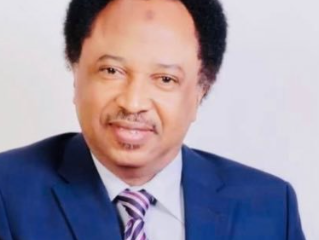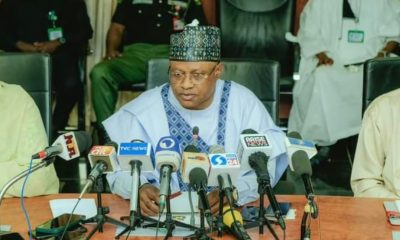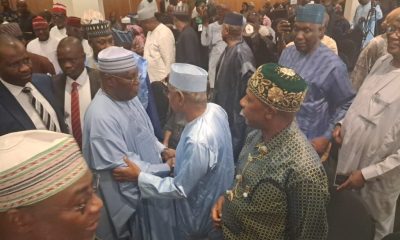Featured
We killed NITEL for Nigeria Progress, says El-Rufai
Published
6 years agoon
By
Olu Emmanuel
The Executive Governor of Kaduna State, Mallam Nasir El-Rufai has admitted that the Nigerian Telecommunications Limited (NITEL) was shut down to make economic progress for the country.
He also acknowledged to have being one of those who killed the Nigerian Telecommunications Limited (NITEL).
El-Rufai, however justified his action on the need to liberalized the telecom industry.
Speaking at the 20th anniversary and Awards Night of the Association of Licenced Telecommunications Companies of Nigeria (ALTON) at the weekend in Lagos where he received the Industry Achiever’s Award for his contribution to the development of the telecom sector, he announced that he was happy NITEL died.
““I am happy that NITEL died. It deserved to die. It was retarding the progress of the nation. The telecom revolution caught them unawares”, el-Rufai declared.
Governor El-Rufai, who also accepted the Smart City Award from ALTON in recognition of Kaduna State’s support for telecom infrastructure development, thanked ALTON members for the revolution in the telecoms sector, for moving Nigeria from 400,000 mobile subscribers in 1999 to 179 million lines in 2019.
He said the celebration by ALTON should be accompanied by a story of the revolution in the Nigeria telecoms, noting that “most of the people that are here, some that have died, others that are not here that played significantly role bringing about this revolution, should be recorded for the younger generations to know the efforts, challenges and investments made by the pioneers of the industry.”
Narrating the role he played in ensuring that NITEL never survived, Governor El-Rufai who was the Director – General of the Bureau of Public Enterprises (BPE) and once a contractor to NITEL said the death of NITEL was meant to be, so as to pave way for this day telecommunications revolution.
He also expressed his feelings on how he was frustrated from privatising NITEL severally and narrated the the former efforts of President Olusegun Obasanjo made to deregulate the sector.
“NITEL has died. It was an evil institution that was temping this country, rending telecom poor services. Generally, we targeted the development of the country, we did our best to privatise NITEL, because we saw them clearly, we saw what they didn’t see, we saw that they were going to die. But they didn’t get it, they thought the world was going to remain the way they want it.
“I did not want the death of NITEL, but they deserve to die, at least $7 billion of our money went to them. NITEL was a giant company, but they never wanted any other telecom company in the sector competing with them. The economy is called self-trust but what do we have now?
“NITEL never believed that what is happening today will happen,” the former minister of the Federal Capital Territory said, noting that as the DG of BPE, when he came on board, the first thing they did was to share NITEL’s data connection and made them to be more affordable.
Professor Buba Bajoga, Managing Director of NITEL between 1995 and 1999, was unwilling to accommodate the private telecom operators (PTO) that were licensed to provide alternate phone services, because he considered them as parasites out to feed from the public network and was not disposed to giving access to the private network.
From the late 1990s to the early 2000s, NITEL’s hierarchy made it difficult for the private telecom companies to get interconnect and exchange facilities from NITEL, which made it difficult for them to operate.
El-Rufai stated that upon its death; he advised former President Olusegun Obasanjo to go ahead tell the Nigerian Communications Commission (NCC) to issue the Digital Mobile Licence (DML) in 2001 which eventually gave birth to the likes of MTN, Airtel, Glo, 9mobile and so many other smaller private telephone operators (PTOs) in the country today.
While El-Rufai celebrated the death of NITEL as what was necessary to bring about the water shed development of the telecom sector, he disclosed that some foreign companies did not properly assess the growth potentials of the Nigerian telecom market.
Vodafone of the United Kingdom was one of them, who rejected a license offer of $1million in 2000 to come and operate a mobile network.
That rejection turned out to favour Nigeria, because after it the former Executive Director of NCC, Dr Ernest Ndukwe opted for a contest licensing approach that eventually raised $855 million in 2001 for Nigeria.
On his part, the Chairman of ALTON, Engr. Gbenga Adebayo paid tributes to the founding father of Nigerian telecom industry, narrating how Nigeria has moved 20 years ago from four cellular mobile networks with limited coverage and 26,500 connected lines, one national operator with 500,000 connected lines (One telephone line per 400 inhabitants), 35 Internet service providers (ISPs) with approximately 17,000 customer base.
He said the telecom sector contribution at that time to GDP has moved from less than one per cent in 1999 to 11.4 per as at second quarter 2019.
“We have moved from less than $50 million marginal private sector participation and foreign direct investment (FDI) to over $68 billion private investment today,” said Adebayo.
The ALTON chairman noted that from inception, PTOs battled absence of policy document articulating sector growth path and development objectives; Ineffectual regulatory framework establishing sector regulator; and costly access charges, yet unsatisfactory levels of service provision.
Others include: Limited opportunity for private sector participation; Wide gulf between service demand and service supply; no competition/total dominance by state-owned monopoly entity; and waiting time for telephone was 24-48 months from NITEL.
He said his members addressed the peculiar early challenges including issues of signaling protocol issues, interconnectivity, billing issues, multiple regulation and taxation issues of right of way and protection of the overall interest of private investors in the sector, which NITEL as the incumbent did everything possible to frustrate their existence.
ALTON was formed in 1999, then known as the National Association of Telecom Operators (NALTO) and incorporated in the year 2000 as ALTON), a corporate body, duly registered under the laws of Federal Republic of Nigeria as an Incorporated Trustee, and officially recognized by the government and the NCC and other regulatory agencies as the industry body for all providers of telecoms subsidiary services in Nigeria.
You may like


The poor should not bear the burden of sacrifice – Shehu Sani, others tell Tinubu


NDA holds shooting exercise, warns Kaduna residents


Army war college begins study tour to enhance Nigeria’s security


Gov Sani commend state police


Gov Sani attributes Appeal Court victory to people of Kaduna State


Tribunal to deliver judgement on Kaduna Governorship poll virtually
Trending

 Latest1 week ago
Latest1 week agoFubara pledges collaboration with APC lawmakers after Rivers by-elections

 Health7 days ago
Health7 days agoGroups launch ‘COVID Justice’ campaign, urge U.S. Senate to adopt accountability resolution

 Football7 days ago
Football7 days agoJuventus prepare €120m bid for Osimhen as summer rebuild plans gather pace

 News1 week ago
News1 week agoFamily demands coroner’s inquest into death of Chimamanda Adichie’s son

 News1 week ago
News1 week agoMother, son escape death as Lexus SUV overturns three times in Lagos

 Latest7 days ago
Latest7 days agoAtiku, Obi, Mark, Amaechi, others meet in Abuja ahead of major press conference

 Latest7 days ago
Latest7 days agoAttack on Obi: APC denies involvement, accuses ADC of playing politics

 Crime7 days ago
Crime7 days agoDisturbing video emerges showing bandits beat abducted man, children in Niger State

